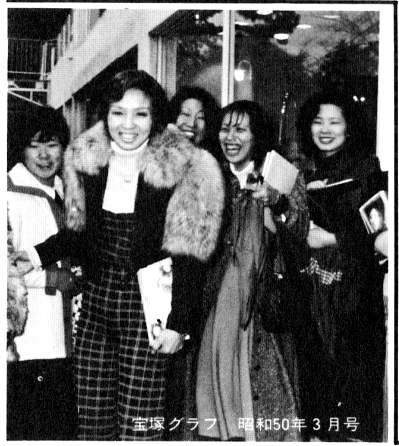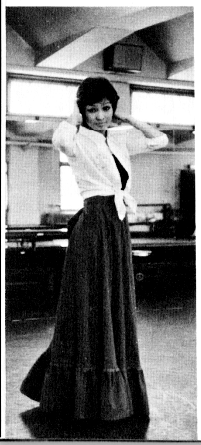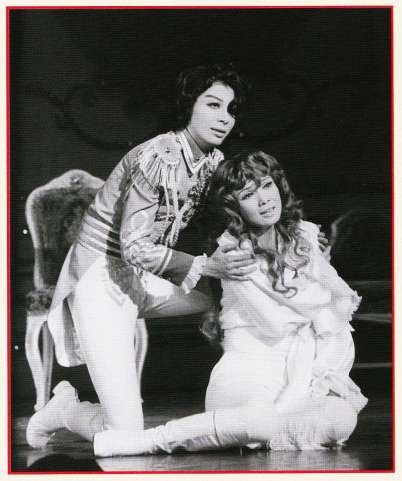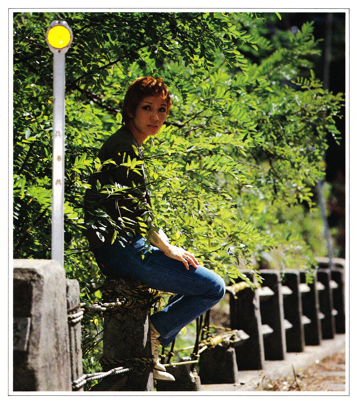This book, which is something of an ‘oral history’ of Takarazuka’s Rose of Versailles adaptations, was published by Ascom in late 2005, and features chronological accounts from otokoyaku who had performed in the franchise from its first origins through the 2001 productions. Since the book is derived from transcriptions of interviews taking place often many decades after the fact, there may be discrepancies between accounts.
Please note that the term appearing through the text as ‘theatre-comic’ is translated from the Japanese term gekiga [劇画]. Although this term is described as applying to mainly male-oriented comics in most English-language sources, this is no longer accurate. The definition of this word has changed to also include sweeping, romantic female-oriented works with Rose of Versailles being arguably the most famous of theatre-comics. Takarazuka even published its own magazine of theatre-comics in the 1970s.
Chapters have been split in two to make them more readable without too much scrolling to reach the explanatory footnotes. Some paragraph breaks have also been added for ease of reading in English. I have also included some images printed in the book as well as sourcing many other archival images to illustrate the text.
Migiwa Natsuko

1946 – Born December 21 in Osaka
1964 – Entered Takarazuka, debuting with Tale of the Flower Village
1973 – Became Snow Troupe Top Star with Cante Grande1
1975 – Played Oscar in The Rose of Versailles
1980 – Retired from the Takarazuka Revue with For You Who Have Left Us
Other notable works:
Man of Starlight, Gone with the Wind, Love Blooms Out On the Murasakino, Johnny on the Hill, The Blue Suitcase, etc.
Post-retirement activities:
Her main focus is the stage, with appearances including Annie, The Stage Turns, Journey to the West, Sakura Fubuki Tanuki-Goten, etc., as well as the film Yakuza Ladies and other TV appearances, dinner shows, etc.
I prayed to God for Oscar
I was burning up with excitement! Yahoo! I did it!! I was so, so happy. My feelings when it was first decided that I would perform in ‘Berubara’ are something that still come as fresh as ever, even now.

Before then, I had already read the manga by Ikeda Riyoko, and I wanted to perform in it more than anything. I just longed for it. And of course, I wanted to be Oscar with her golden curls!! Ever since reading it, I’ve thought that there never was a work more perfect for Takarazuka.
But then Haruna Yuri ended up being cast for the first production so I thought ‘I’ll never get the chance to do it now’…it was a huge shock. Once it was decided that one troupe (Moon Troupe) would do it, I thought, well, it’s never going to come around to us, so I really did pray.
“Lord, if it is Your will, please give me the chance to perform in Berubara too!”, I prayed.
And then, what do you know? It turned out there would be a follow-up production, and I got my turn as Oscar! I’d never been so happy in my life. When the second performance was decided, I felt like I was being taken up to Heaven.
Of course, if you think of Berubara the first thing that comes to mind is the theatre-comic. The way Ikeda Riyoko added the two fictional characters of Oscar and Andre against the huge reality of the French Revolution is just incredible. I think that if, say, it was only Marie-Antoinette and Fersen, it would never have exploded the way it did.
And then, the art is so beautiful!! To imagine that me, of all people, could appear in such a work…I’m so grateful.
Berubara is actually a really unpretentious work. Personally, I especially liked the scene where Oscar is playing the violin as Andre is planning to poison her. Even though it’s a scene where Andre tries to give Oscar poisoned wine, and then asks her ‘Forgive me!’, it’s such a gentle and calm scene, you know, and the way Oscar is giving her lines while playing the violin is so emotional…
When she asks Andre “What’s the matter with you today?” with her back to him, how do I say it, something in her heart is buried somewhere in those words, I guess? Even though I [Oscar] am at rest, he [Andre] is full of such desperation. Their feelings at that moment are totally opposite. He loves her so much that he’ll kill her. Though he loves her enough to kill her, what can he do…it’s painful. It’s so heartbreaking. It’s not something that could be resolved just by talking it over, so I still think it’s a great scene.
Actually, because of that scene, I love the violin now! Not playing it, though, just listening (laughs).
That ‘tralala…tralulala…’ [violin] bit, that piece is played by someone in the orchestra. They would match my movements, and I could see them playing in the orchestra pit, and it matched up so perfectly, and—of course this was the point—it really felt just like I was actually playing. I loved that atmosphere so much! I never had much interest in the violin before then, but I became totally absorbed in it.
The scene in the second half of the play where I die and am reborn felt wonderful, and it was also one of my favorite scenes. There was a beautiful shining chandelier, and as I was called up to heaven I floated up, walking on the clouds…that moment always made me feel like The Little Prince2.

And then Andre comes in the carriage, calling “Oscar~”, right? That was another scene I liked that felt wonderful, but I had to run which was a pain, and, actually I even tripped once (laughs). I just vanished into the smoke billowing around, so it was like ‘where’d she go?’
But back then, it was Taako (Asami Rei) playing Andre, and she doesn’t have very good vision, so apparently she couldn’t even see clearly that I had fallen. So I was thinking “Andre, get out of that carriage and help me!” as I was struggling in the smoke (laughs). But later I realized “Of course she couldn’t get out of the carriage…”
Well, it seems like the audience might have been fooled, anyway: I’m not really sure since it all happened so suddenly, but when Oscar vanished into the clouds they might have just thought ‘Oh, did she leave…?’
I felt the woman inside me through Oscar
Even though Oscar was a role I’d longed and prayed for, it was actually a really difficult role for me. While Oscar is a woman, she wears men’s clothes and was raised as a man. While I am a woman, I play men’s roles. Though that might appear to be the same thing, it’s actually totally opposite! Not even opposite, they’re in completely different realms.

You see, in Takarazuka, women play ‘men’, specifically. But Oscar, she’s a ‘woman’. So, it’s not a male role. Though she was raised as a man, at her heart she’s a woman, so it absolutely can’t turn into a male role. This was a struggle…
At first, I thought of it rather lightly, thinking that since I play men’s roles, we were in the same situation. But then in the middle of things I started worrying about it so much… Andre and Fersen, they’re fully male roles. But Oscar isn’t a man. But even so, while she was a woman she was raised as a man, so what exactly would that be like…is what I was thinking.
Though I, the performer, am a woman, since I did male roles, they were, in that respect, easy for me. But, Oscar is a woman, but she was raised as a man…so I had to go down layer after layer after layer, to a really perilously balanced position.
I had to re-examine everything from square one. Of course, the way people playing the role handled it varied, but for me, the issue was…how well could I capture the nuance of being between those layers?
Ultimately, since Oscar is a woman, she isn’t the same as Andre. I absolutely had to show that “womanly” aspect.
I couldn’t let my otokoyaku voice show through, even in one sentence. For example, while saying “isn’t that right?” it had to be a manly and gallant…woman’s voice (laughs), so I was producing my voice from a very strange position. And on top of that, she is a noble, so it couldn’t be un-elegant either.
Her character and intelligence, and on top of that, even her way of walking were difficult for me. I couldn’t take large, vigorous strides like I would in a male role. Though I was wearing a uniform and boots, I had to be graceful. My foot placement was really hard. Walking softly and gracefully while wearing boots, you know (laughs).
‘Gallant and brave’ is my motto even now (laughs), but since Oscar is the captain of the French Guards, she needs the gallantry to lead real men, but there still has to be a womanly side remaining: she can’t stop being a woman. No matter how much I thought about that in my head, I couldn’t do it right. So, personally, it was an extremely difficult role for me.
I think that at first I was pretty stiff. As I kept on performing and performing, I feel like gradually a womanly softness came into it. It felt like while I was performing I transformed. Therefore, I think it wasn’t until around the second half of the run when I was able to be onstage ‘feeling like Oscar’.
But, maybe because I felt so strongly “to start out, I have to become Oscar,” I personally became more and more womanly. Therefore, I discovered “my super feminine side” inside my heart (laughs).
I was able to really experience that feeling of ‘becoming a woman’: when someone you hadn’t really been conscious of as a man or a woman, someone who had been with you constantly, suddenly confessed feelings—it was a really odd feeling, feeling myself becoming a woman.

Of course, this was all in the story, so perhaps there wasn’t any need to think about it so much. But somehow I ended up considering it all really deeply… I was startled at my own femininity, but it helped me feel that Oscar was just as ‘woman’ as that too.
After all, Oscar tells Andre ‘[I want to be] your wife’! Actually, that line was so embarrassing (laughs). ‘Your wife’, she says. Being told someone loves her, and thinking ‘oh, is that really true?’, and then breaking down, that’s so ‘woman’, right?
Still, at the time, of course I was overwhelmed, so I didn’t perceive things that far, but thinking about it now, that soft side of Oscar is what really makes you think, oh, she’s a woman after all.
As you can see, I really tend to think deeply about the roles I perform. Therefore, while I was performing in Rose of Versailles, my heart was 100% Oscar. I really burned with intense love for Andre, I really felt all those feelings, you see.
Even though I could slip into the feelings so completely, once the curtain came down and it was like “Good work today~,” the gap with reality was so huge that this was the hardest part for me. On stage, I was in such a beautiful, pure world, but the moment it ended, it all instantly vanished like popping bubbles and there was nothing left—it was the loneliest feeling in the world. There was nothing harder than going back to my ordinary self after the show ended.

Because of that, I was always thinking, why can’t I live like this, in this makeup, all the time? I would have been so happy if I could do that. The gap between [Oscar] and my real, ordinary self, who didn’t have anything, was always painful. It was somehow like, as soon as the curtain fell, my heart would escape the shell of my body and I’d be left in a blank daze.
Of course, all of this is in my case alone; there were people who handled it totally normally, “Ah, good job~.” That was definitely the happier way to be. For me, day after day, once the curtain fell I felt so vacant… In the end, even though I kept falling in love with Andre, I didn’t have any time to spare for romance in my private life. I was totally occupied with performances and rehearsals. I’m a weirdo, in other words (laughs).
My emotional attachments to each and every little thing were too intense, maybe. I feel like it was a really silly way of living. If I was reborn I’d like to live a different way. I’d like to be reborn as a man and live differently.
1 – As with the other first Top Stars, the exact dates are arguable, though the starring lineup in Snow was clearer than with Haruna and there do not seem to be any rival claimants.
2 – A reference to the book by St.-Exupery.
